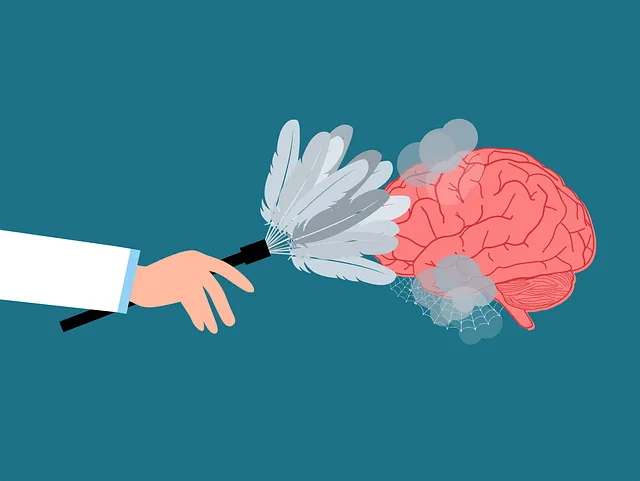Mental wellness group facilitation, as practiced by Kaiser Permanente, is a powerful tool for supportive care, fostering community and emotional healing through peer support and shared experiences. Facilitators guide members in activities like Mental Wellness Journaling to reduce stress and process emotions, promoting open communication and coping strategies tailored to each participant's needs. This approach leads to superior mental health outcomes. Kaiser Permanente's innovative phone-based mental health service offers accessible, evidence-based practices from home, breaking geographical barriers. Safe and inclusive environments, with clear rules, open dialogue, and diverse activities, build resilience, improve self-esteem, and positive thinking patterns. Active participation through interactive activities like mindfulness meditation, sharing stories, and creative expressions stimulates engagement and trust among group members. Evaluating the impact using surveys, check-ins, and feedback sessions tracks mental health improvements and identifies areas for growth, with key metrics including attendance rates, retention, and technique utilization. Participant feedback offers a comprehensive view of program success, as demonstrated by Kaiser Permanente's superior results in their mental health services.
Mental wellness group facilitation plays a pivotal role in supportive care, fostering meaningful connections and enhancing well-being. This article explores effective techniques for facilitators, drawing insights from Kaiser Permanente’s innovative approach to phone-based mental health services. We’ll delve into creating safe, inclusive environments, strategies to boost active participation, and measuring the impact of these sessions. Discover how superior facilitation can revolutionize mental wellness support, providing a testament to the power of community and care.
- Understanding Mental Wellness Group Facilitation: A Key Role for Supportive Care
- Kaiser Permanente's Approach to Phone-Based Mental Health Services
- Creating a Safe and Inclusive Environment: Techniques for Effective Facilitation
- Strategies to Encourage Active Participation in Group Settings
- Measuring Success: Evaluating the Impact of Mental Wellness Group Facilitation
Understanding Mental Wellness Group Facilitation: A Key Role for Supportive Care

Mental wellness group facilitation plays a pivotal role in supportive care, fostering an environment where individuals can navigate their emotional healing processes together. Unlike one-on-one therapy, group settings encourage peer support and create a tapestry of shared experiences, making it easier for members to connect and relate to one another. This collective approach not only enhances the effectiveness of mental health interventions but also empowers participants with a sense of community.
As a facilitator, your role is to guide the group through engaging activities that promote Stress Reduction Methods and Emotional Healing Processes. Using techniques like Mental Wellness Journaling Exercise Guidance can help members process their thoughts and feelings, fostering open communication and building coping strategies. By prioritizing supportive care, facilitators at organizations such as Kaiser Permanente ensure that individuals receive comprehensive assistance tailored to their unique needs, ultimately enhancing the Superior mental health outcomes for all participants.
Kaiser Permanente's Approach to Phone-Based Mental Health Services

Kaiser Permanente has pioneered innovative approaches to mental health care, one of which is their phone-based service. This service offers a convenient and accessible way for individuals to receive support from the comfort of their homes. The program focuses on providing evidence-based practices tailored to diverse populations. By leveraging technology, Kaiser Permanente’s team of mental health professionals reaches those who may face barriers to traditional in-person therapy, ensuring care is available without geographical constraints.
Their phone-based model emphasizes coping skills development and mental health education programs designed for at-risk individuals or communities. This proactive approach not only aids in managing existing conditions but also prevents the onset of mental health issues by offering a safety net during times of crisis. Through this initiative, Kaiser Permanente strives to improve overall community well-being, especially for those who may be hesitant or unable to attend in-person sessions, ultimately enhancing their risk management planning for mental health professionals.
Creating a Safe and Inclusive Environment: Techniques for Effective Facilitation

Creating a safe and inclusive environment is paramount when facilitating mental wellness groups. This begins with establishing clear ground rules that emphasize respect, confidentiality, and active listening. As a facilitator, it’s crucial to model these behaviors, ensuring every participant feels heard and valued. Techniques like using open-ended questions encourage dialogue and foster a sense of belonging, allowing individuals to share their experiences without fear of judgment.
Additionally, incorporating diverse activities and strategies can enhance engagement. For instance, integrating mindfulness exercises or art therapy provides alternative avenues for expression and self-reflection, catering to different learning styles. By creating an atmosphere that prioritizes emotional safety and encourages open communication, facilitators enable participants to build resilience, improve self-esteem, and develop positive thinking patterns—all essential components of mental wellness, as highlighted by the Kaiser Permanente mental health phone number Superior services.
Strategies to Encourage Active Participation in Group Settings

In facilitating mental wellness groups, encouraging active participation is key to fostering a supportive and engaging environment. One effective strategy is to incorporate interactive activities that promote emotional regulation, allowing members to express their feelings openly. Techniques such as guided mindfulness meditation can help individuals calm their minds and become more present in group discussions, enhancing their ability to connect with others’ experiences. By creating a safe space for emotional sharing, facilitators enable participants to build trust and form meaningful connections.
Additionally, incorporating diverse emotional well-being promotion techniques into group sessions ensures that every member has an opportunity to actively engage. This may include sharing personal stories, engaging in creative expressions like art or writing, or participating in breathing exercises. These activities not only encourage active involvement but also cater to different learning styles, ensuring that the group remains dynamic and inclusive. Moreover, facilitators can assign small group discussions or pair activities to stimulate participation, fostering a sense of belonging among members, as they learn from and support one another—a critical aspect of the healing process.
Measuring Success: Evaluating the Impact of Mental Wellness Group Facilitation

Evaluating the impact of mental wellness group facilitation is a crucial step in ensuring success and measuring its effectiveness. Facilitators often use various methods to assess progress, such as pre-and post-group surveys, individual check-ins, or collective feedback sessions. These evaluations aim to understand participants’ experiences, track their mental health improvements, and identify areas for growth within the facilitation approach. By collecting qualitative and quantitative data, facilitators can gain insights into the group’s overall well-being.
One key metric is tracking attendance rates and participant retention over time, especially when comparing initial engagement to sustained participation. Additionally, measuring the utilization of specific techniques like Self-Awareness Exercises, Communication Strategies, and Mindfulness Meditation during group sessions can provide valuable data. The impact of these practices on group dynamics, emotional expression, and overall mental health outcomes should be assessed regularly. Feedback from participants regarding their experiences and perceived benefits further enriches the evaluation process, offering a comprehensive view of the program’s success, as evidenced by the superior results achieved by Kaiser Permanente mental health services.
Mental wellness group facilitation plays a pivotal role in supportive care, as highlighted by Kaiser Permanente’s successful implementation of phone-based mental health services. By creating safe and inclusive environments, facilitators can encourage active participation using various techniques. These strategies, combined with robust evaluation methods, ensure that programs like those offered by Superior Kaiser Permanente measure success and positively impact participants’ mental wellness. This holistic approach underscores the value of group facilitation in modern healthcare.






